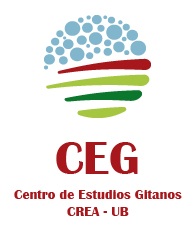
The main objective of CEG is to give response to the real needs of the Roma community, generating a scientific, rigorous and critical knowledge about the situation of this community, promoting their social and educational inclusion, as well as to fighting against anti-gypsyism.
CEG is developing projects and initiatives for the Roma people thanks to the Communicative Methodology that guarantees the participation of this community throughout the whole research process. In this sense, the Advisory Council is formed by representatives of the most relevant Roma and Pro-Roma organizations and associations (Unión Romaní, Drom Kotar Mestipen, Fundación Secretariado Gitano, among others) and other Roma men and women that participate individually due to their leading role within the community – is a key point to guarantee this participation.
Some of the results of the most relevant activities that show scientific, political and social impact attained by the group are the following:
- WORKALÓ. The creation of New occupational patterns for cultural minorities. The Gypsy case. RTD. FP5. DG XII. Improving the Socio-economic Knowledge Base. (2001-2004). Investigador principal: Ramón Flecha.
- TRANSROMA. Estrategias de movilidad, retorno y prácticas transnacionales entre población gitana rumana. Ministerio de ciencia e innovación. (2012- 2014). Investigadora principal: Prof. Teresa Sordé.
- Actuaciones socioeducativas de éxito para la superación de la pobreza. Plan Nacional I+D+I. Secretaría de Estado de Universidades e Investigación. Ministerio de Educación y Ciencia (2012-2014). Investigadora principal: Prof. Rosa Valls.
- Inmigración gitana en España: los retos de la inclusión social y la convivencia. Ministerio de Ciencia e Innovación. Plan Nacional I+D+I (2008-2011). Investigadora principal: Prof. Teresa Sordé.
- MESTIPEN ROMÍ: Mujer gitana y asociacionismo en España. Retos y contribuciones. Plan Nacional I+D+I. Comisión Interministerial de Ciencia y Tecnología. Ministerio de Trabajo y Asuntos Sociales / Instituto de la Mujer. (2004–2006). Investigadora principal: Prof. Carmen Elboj
- Flecha, R., & Soler. M. (2013). Turning difficulties into possibilities: engaging Roma families and students in school through dialogic learning. Cambridge Journal of Education, 3(44), 0305-764X. doi: 10.1080/0305764X.2013.819068.
Other relevant publications:
- Sordé, T & Macías, F. (in press). Making Roma Rights a Reality Through Successful Actions: The Case of La Milagrosa (Albacete). In Bhabha, J. (Coord.) Realizing Roma Rights. Harvard Univeristy Press
- Flecha, R. (2014). Using mixed methods from a communicative orientation: Researching with grassroots Roma. Journal of Mixed Methods Research, 3(8), 245-254. doi: 10.1177/1558689814527945
- Sordé, T., Serradell, O., Puigvert, L., & Munté, A. (2013). Solidarity networks that challenge racialized discourses: The case of Romani immigrant women in Spain European Journal of Women’s Studies 1350506813510425, first published on November 20. DOI:10.1177/1350506813510425
- Aiello, E., Mondejar, E. & Pulido, M.A. (2013). Communicative Methodology of Research and Recognition of the Roma People [Special issue]. International Review of Qualitative Research, 6(2): 254-265.
- Sordé-Martí, T., Munté, A., Contreras, A., & Prieto-Flores, O. (2012). Immigrant and Native Romani Women in Spain: Building Alliances and Developing Shared Strategies Journal of Ethnic and Migration Studies, 38(8), 1233-1249. doi: 10.1080/1369183X.2012.689179.
- Macías, F., Redondo, G. (2012). Pueblo gitano, género y educación: investigar para excluir o investigar para transformar. International Journal of Sociology of Education, 1(1), 71-92.
- Munté, A., Serradell, O. & Sordé, T. (2011). From research to policy: Roma participation through communicative organization. Qualitative Inquiry, 17(3), 256-266.
- Gómez, J.; Vargas, J. (2003): Why Romà do not like mainstream schools: voices of a people without territory. Harvard Educational Review. v. 73, pp. 559-590.
Related documents:
Col·laboració amb organitzacions no governamentals i amb els moviments socials
The CEG also collaborates and participates with other non-governmental organisations and social movements linked to the social inclusion of the Roma community. Some examples are:
- OECD, Organisation for Economic Co-operation and Development
- Sordé, T. (2010): Romani Immigrants in Spain. Knocking Down the Walls. Barcelona: Hipatia.
- REYN, Roma Years Early Network. International Step by Step Association (ISSA) funded by REF, Roma Education Fund.